Gender Studies
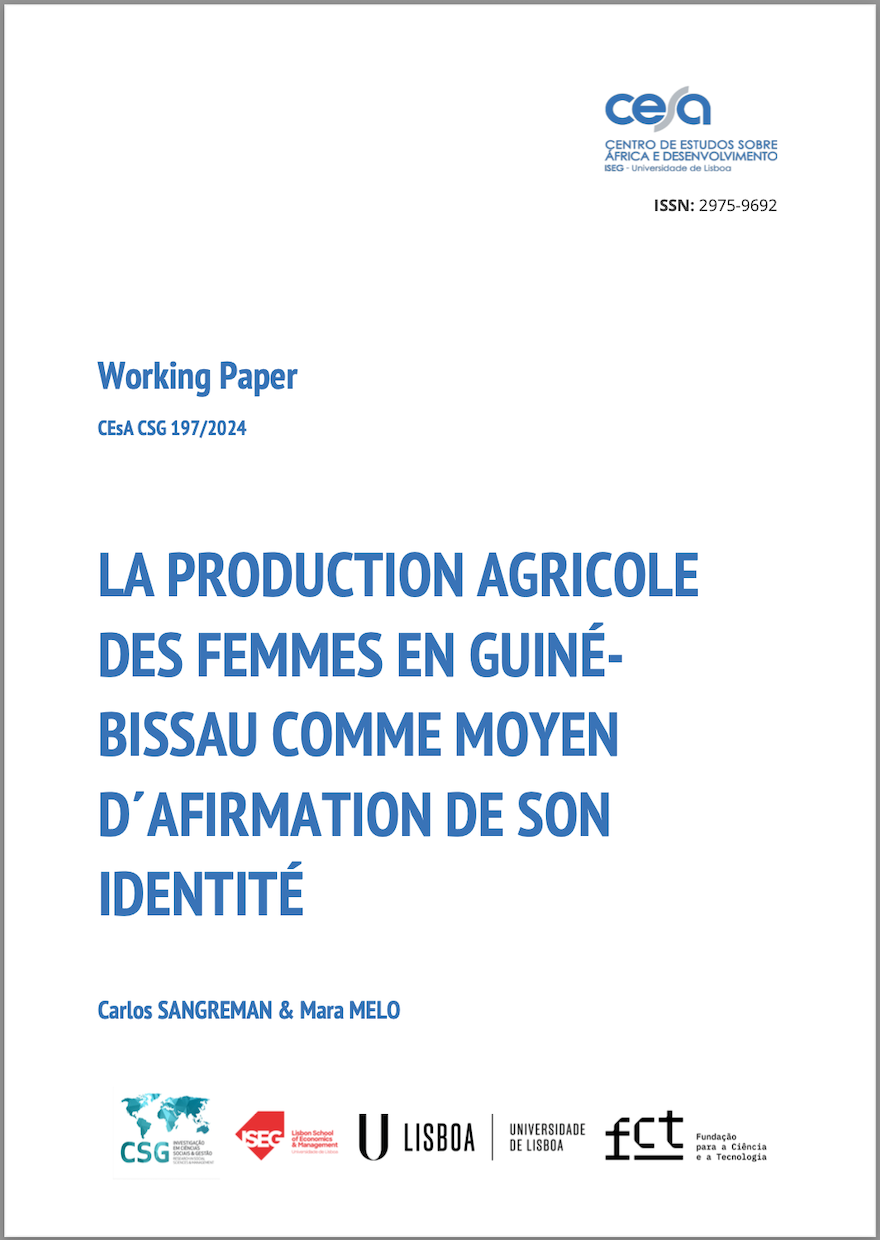
Working Paper 197/2024: La Production Agricole des Femmes en Guiné-Bissau comme Moyen d´Afirmation de son Identité
Abstract:
This working paper is an intermediate product of the study done for Swiss Cooperation in Guinea-Bissau, written in French without any point in Portuguese. What we demonstrate, as well as the principles of restitution and appropriation by the persons or institutions that access to respond to surveys or interviews, are words that do not translate into concrete actions for this Cooperation. The data were obtained by surveys and interviews in the regions of Bissau, Biombo, Bafatá, and Oio, with the producers (which also include a limited number of male producers) of leguminous agricultural products, in a sample of 160 people chosen at random. At the option of the promoter, the study focused on the marketing of products and not on production. To better understand the results, it must be said that this business model is not very profitable, but it is an activity that gives a greater independence of women in relation to men in the family space, since decisions about the use of profits belong to the producers. It also has a potential environment of action for the affirmation of the social (and not just family) identity of women that should not be despised although, as far as we can see, this is expressed for now only in the organization of associations of producers.
Cite this Working Paper:
Sangreman, C. e Melo, M. (2024). “La Production Agricole Des Femmes En Guiné-Bissau Comme Moyen D´Afirmation De Son Identité”. Instituto Superior de Economia e Gestão – CEsA/CGS – Documentos de trabalho nº 197/2024
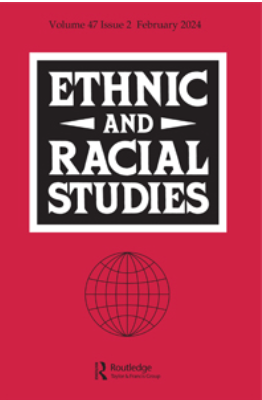
African women’s trajectories and the Casa dos Estudantes do Império, Ethnic and Racial Studies
Abstract:
This article compares the trajectories of different women who crossed the Casa dos Estudantes do Império (CEI), a formal institution created in Lisbon by students from the colonies with the support of the Portuguese dictatorial regime in 1944, that became a platform for anti–colonialism. Due to the role played by the CEI in the political and social paths of the leaders of African national liberation movements, historiography has privileged masculine accounts. In contrast, the roles and lives of women linked to the CEI remain unexplored or approached from a vision of “methodological nationalism”, with few exceptions. Addressing these trajectories from a transnational and “Afro–Iberian” lens and through the scrutiny of several sources allows us to reflect on a diversity of gender, race, class, and political ideology. The final aim is to illuminate some aspects of the Afro–Iberian mosaic from a gendered and postcolonial perspective.
Citation:
Jessica Falconi (2023) African women’s trajectories and the Casa dos Estudantes do Império, Ethnic and Racial Studies, DOI: 10.1080/01419870.2023.2289141

Literatura colonial de autoria feminina: O Último Batuque, de Maria do Céu Coelho
Abstract:
Portuguese colonial literature written by women has received little attention in Lusophone literary and cultural studies. The most relevant exception, in this regard, is the case of Maria Archer, author of a significant number of fiction and non-fiction texts of colonial setting and theme that have received diverse readings and analyses. In particular, Ferreira’s works on women’s authorship writing and the connections between gender, nation and empire were pioneers in approaching this production according to an integrated theoretical framework, capable of illuminating material and symbolic transits and identity reverberations between nation and empire, in line with the paradigms of colonial and feminist historiography of the 1990s. Literatura colonial de autoria feminina: O Último Batuque, de Maria do Céu Coelho, aims to deepen and broaden the knowledge of Portuguese women’s writing on colonial themes, by providing a reading of the book O último batuque (1963) by Maria do Céu Coelho, published in Mozambique in the early 1960s. It is a singular work, for focusing on the eminently masculine topic of hunting from a woman’s perspective, and also for being a hybrid book that combines memorialistic writing and short novellas about the rural universe of colonial Mozambique. The paper discusses some of the essential characteristics of Portuguese colonial literature, as it has been conceptualized by several authors in previous studies. Resorting also to the vast literature on the articulations between gender, empire, and colonialism, the article seeks to equate the author’s position in the corpus of colonial literature, as well as to reflect on how her literary writing articulates race and gender.
Quotation:
Falconi, Jessica (2021) “Literatura colonial de autoria feminina: O Último Batuque, de Maria do Céu Coelho,” Portuguese Cultural Studies: Vol. 7: Iss. 1, Article 4.
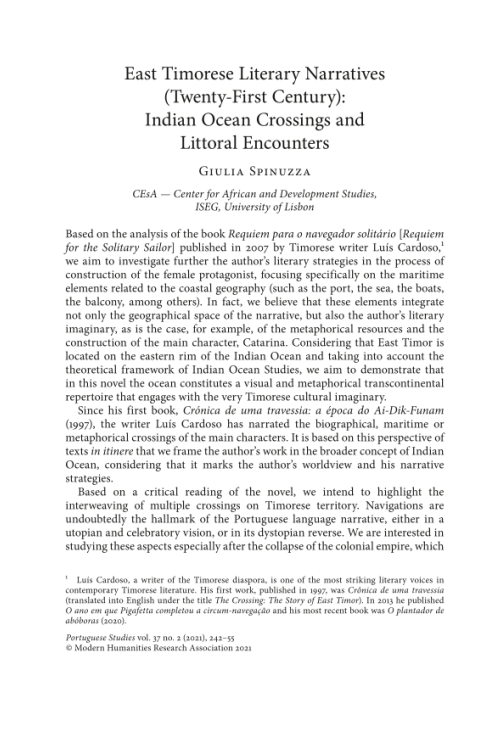
East Timorese Literary Narratives (Twenty-First Century): Indian Ocean Crossings and Littoral Encounters
Abstract:
The aim of East Timorese Literary Narratives (Twenty-First Century): Indian Ocean Crossings and Littoral Encounters is to analyze the book Requiem para o Navegador Solitário (2007) [Requiem for the Lonely Sailor] by Luís Cardoso considering the maritime elements that emerge in the novel and combining Indian Ocean Studies with Gender Studies. Pointing to the Timorese imaginary and the female protagonist’s perspective, we will focus on the elements related to the island’s coast, such as the shore, the sea, ships, sailors, and the interconnection with other islands and territories during the colonial period. In fact, we believe that these elements integrate not only the geographical space of the narrative, but also the literary imaginary, as is the case, for example, of the metaphorical resources and the construction of the main character, Catarina. Considering that East Timor is located at the eastern edge of the Indian Ocean and taking into account the theoretical theory of Indian Ocean Studics, we intend to demonstrate that in this novel the ocean constitutes a visual and metaphorical transcontinental repertoire that relates to the Timorese cultural imaginary itself. We will analyze the connection between the existential trajectory of Catarina, the novel’s female protagonist, the history of East Timor and the Indian Ocean crossings. This text, written in Portuguese by a Timorese author, portrays the complex history of this territory during World War II and offers a unique perspective on Timorese history.
Quotation:
Spinuzza, G. (2021). East Timorese Literary Narratives (Twenty-First Century): Indian Ocean Crossings and Littoral Encounters. Portuguese Studies 37(2), 242-255. doi:10.1353/port.2021.0017.
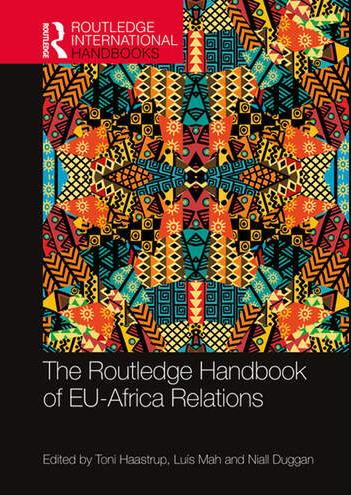
The Routledge Handbook of EU-Africa Relations
Abstract:
This handbook provides a comprehensive overview of the changing dynamics in the relationship between the African continent and the EU, provided by leading experts in the field. Structured into five parts, the book provides an incisive look at the past, present and potential futures of EU-Africa relations. The cutting-edge chapters cover themes like multilateralism, development assistance, institutions, gender equality and science and technology, among others. Thoroughly researched, this book provides original reflections from a diversity of conceptual and theoretical perspectives, from experts in Africa, Europe and beyond. The handbook thus offers rich and comprehensive analyses of contemporary global politics as manifested in Africa and Europe. This handbook will be an essential reference for scholars, students, researchers, policy makers and practitioners interested and working in a range of fields within the (sub)disciplines of African and EU studies, European politics and international studies. The Routledge Handbook of EU-Africa Relations, by Luís Mah (researcher for the Centre for African and Development Studies), Nial Duggan and Toni Haastrup is part of the mini-series Europe in the World Handbooks examining EU-regional relations and established by Professor Wei Shen.
Quotation:
Mah, Luís, Duggan, Nial & Haastrup, Toni (2021). The Routledge Handbook of EU-Africa Relations. Routledge. ISBN 9781315170916.
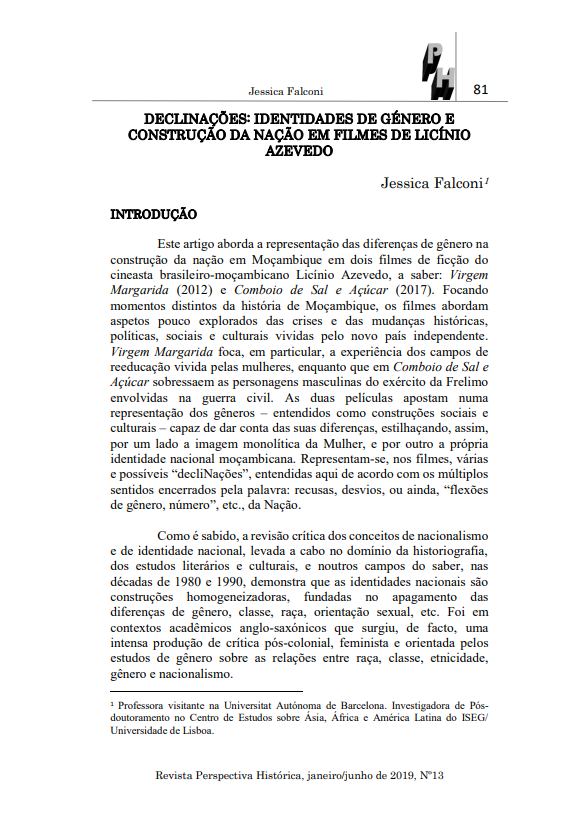
Declinações: Identidades de Género e Construção da Nação em Filmes de Licínio Azevedo
Abstract:
Declinações: Identidades de Género e Construção da Nação em Filmes de Licínio Azevedo addresses the representation of gender differences in nation building in Mozambique in two fiction films by Brazilian-Mozambican filmmaker Licínio Azevedo, namely: Virgem Margarida (2012) and Comboio de Sal e Açúcar (2017). Focusing on different moments in the history of Mozambique, the films address little explored aspects of the crises and the historical, political, social and cultural changes experienced by the new independent country. Virgem Margarida focuses, in particular, on the experience of the re-education camps lived by women, while in Comboio de Sal and Açúcar the male characters of the Frelimo army involved in the civil war stand out. The two films bet on a representation of the genders – understood as social and cultural constructions – able to account for their differences, thus shattering, on the one hand, the monolithic image of women, and on the other, the Mozambican national identity itself. The films represent several possible “decliNations”, understood here in accordance with the multiple meanings of the word: refusals, deviations, or even “flexions of gender, number”, etc., of the Nation.
Quotation:
Falconi, J. (2019). Declinações: Identidades de Género e Construção da Nação em Filmes de Licínio Azevedo. Perspectiva Histórica 13: 81-105. http://www.perspectivahistorica.com.br/revistas/1563933990.pdf“
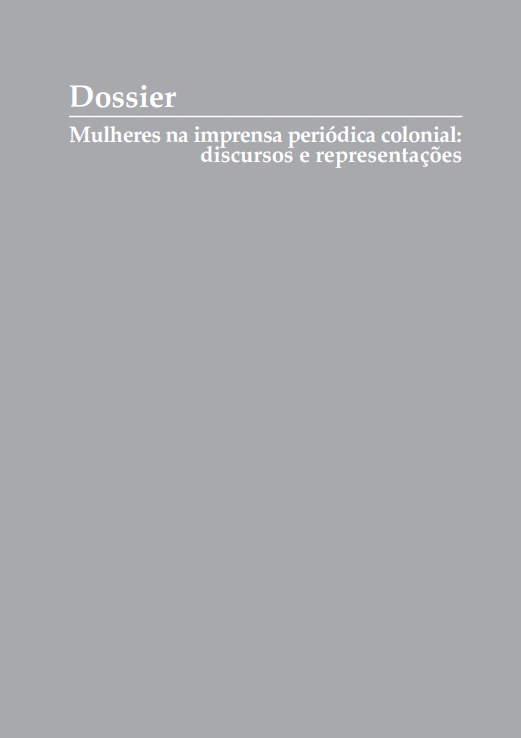
Entre silêncios e interferências: mulheres na imprensa colonial
Abstract:
In Entre silêncios e interferências: mulheres na imprensa periódica colonial we adress the presence of women in the colonial periodical press of the former Portuguese Empire means trying to define, even if only provisionally, the main aspects of the “object” of reflection proposed in the present dossier. Firstly, by proposing a joint approach, under the term “colonial”, of the periodical press published both in the former metropolis and in the various spaces colonised by Portugal, we point to some perspectives of the historiography on European colonialisms which have been shattering polarized visions, analysing the social and political reverberations between metropolis and colonies, the transits of ideas and imaginaries, as well as the “manufactured” dimension of the difference (Burton 1994; Cooper and Stoler 1997). The dossier results from the panel “The ‘women’ and the colonial periodical press” organized in the framework of the International Congress Politics and Culture in the Colonial Periodical Press, which took place from 22 to 25 May 2017, near the CHAM-Centre of Humanities of the New University of Lisbon, in partnership with the CEI-IUL-Centre of International Studies of ISCTE-Instituto Universitário de Lisboa and the CEC-Centre of Comparative Studies of the Faculty of Letters of the University of Lisbon. The Congress was an initiative of the International Study Group of the Colonial Periodical Press of the Portuguese Empire, created by Sandra Ataíde Lobo (CHAM-UNL), Adelaide Vieira Machado (CHAM-UNL) and Cátia Miriam Costa (CEI-IUL). Various entities and researchers from different research centres have joined the Group.
Quotation:
“Falconi, J.; Wieser, D. (2019). Entre silêncios e interferências: mulheres na imprensa periódica colonial, Revista ex aequo- Revista da Associação Portuguesa de Estudos sobre as Mulheres, n. 39. https://doi.org/10.22355/. exaequo.2019.39.01.10.22355/”
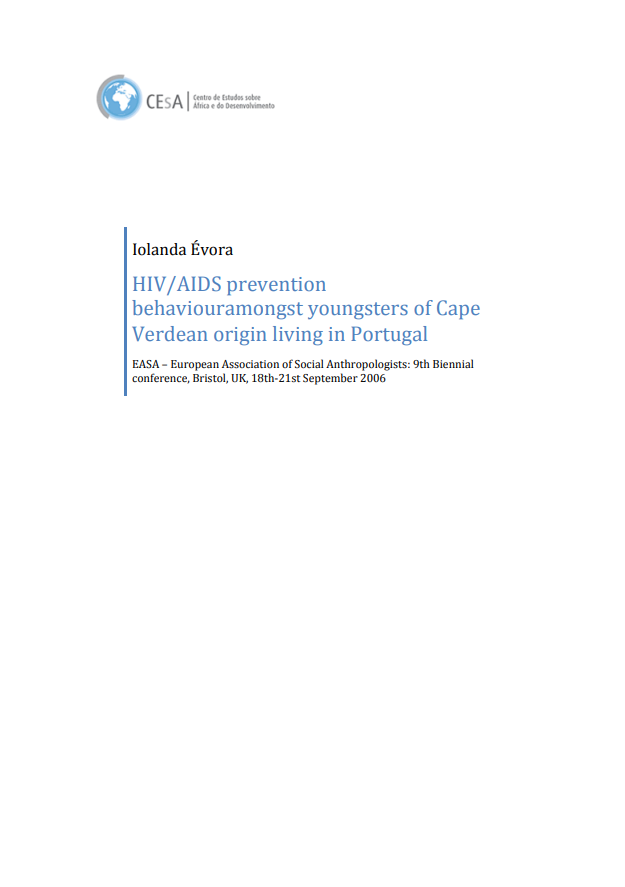
HIV/AIDS Prevention Behaviour Amongst Youngsters of Cape Verdean Origin Living in Portugal
Abstract:
This paper deals with the preventive AIDS behaviour of youngsters of Cape Verdean origin living in Lisbon. It focuses on the group practices and representations of AIDS and gender oriented sexual behaviour. Based on an ongoing research project, the paper argues how AIDS has the potential to become another discriminatory factor in a group already racially and socially stigmatized. This research aims to understand the relation between what young people know about HIV/AIDS and their active prevention behaviour. In addition, it explores how the immigration context may interfere in their behaviour and opinions towards HIV/AIDS and in the practices considered the safest ones to adopt. Therefore, this research is amongst those that aim to ground HIV/AIDS health education proposals on a clear understanding of how different populations or groups conceive their own healthcare. For that purpose, we selected a sample of young people from Cape Verdean origin presently living in Portugal, born in or outside of Cape Verde. Both genders were equally present (8 men and 7 women), aged between 16 and 26 and living in council estates, in other words, housing built on council’s urban redevelopment projects to relocate people from the slums. The areas of interest were chosen for presenting a high number of Cape Verdeans or their descendents: Lisbon, the Greater Lisbon and Loulé. We presuppose that belonging to these areas implies a particular social and economical context; for, although debatable, the definition of ‘council relocation housings’ conveys, to a great extent, a social categorization applied by a system of social classification to immigrants in Portugal. Accordingly, we considered eventual repercussions on the youngsters’ social experience and on their material and symbolic existential conditions, upon which rely daily decisions concerning health and prevention. A qualitative methodology of data collection was adopted, to allow an exhaustive explanatory study and the identification of several perceptual and behavioural patterns. Such methodology, developed by Rodrigues (1978,1999), is the most adequate to reach ‘irrational’ content – denomination commonly applied in Social Sciences to factors that “exist, but cannot be apprehended by reason” (Rodrigues, 1999, p.4). As the author refers, it is about reaching “that which cannot be measured, but is worthy of being known”, more specifically, the emotional content and deeper meaning of youth’s explanations regarding HIV/AIDS prevention behaviour. Thorough individual interviews were carried out, aiming to collect a material able to reveal the representations, the type of perception, the explanatory resources used, the justifications produced according to the roles occupied within a certain group, particularly, their position regarding immigration and HIV/AIDS. By using self-examination (free discourse), we were able to identify main areas of interest and concern, their importance, how they interrelate with their life and the surrounding world. Moreover, aiming to identify exactly how the interviewees place the AIDS issue within their life concerns. Intermediary Questions enable us to explore HIV/AIDS issues relevant to the project, though not spontaneously raised by the youngster during the Free Discourse approach. The Socioeconomic Questionnaire enabled an understanding of the life conditions of this group in Portugal, as well as of their family history. Today we shall discuss here the subject of family migration in its different phases and by each individual.
Quotation:
Évora, Iolanda. 2011. “HIV/AIDS prevention behaviour amongst youngsters of Cape Verdean origin living in Portugal”. Comunicação apresentada na EASA – European Association of Social Anthropologists : 9th Biennial Conference, Bristol, United Kingdom.
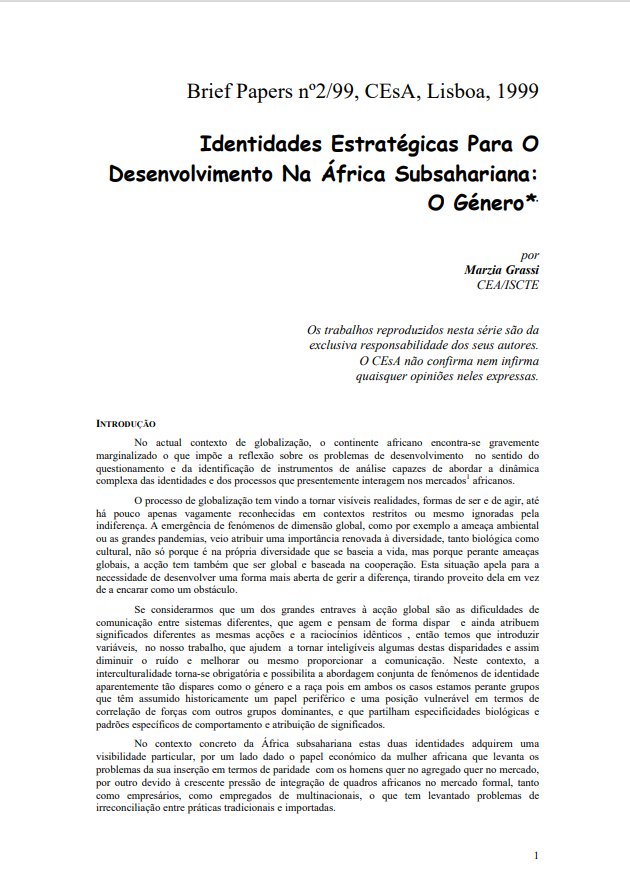
Brief Paper 3/1999: Identidades Estratégicas para o Desenvolvimento na África Subsahariana: O género
Abstract:
In the current context of globalisation, the African continent is seriously marginalised, which makes it necessary to reflect on development problems in order to question and identify analytical instruments capable of dealing with the complex dynamics of identities and processes that are currently interacting in African I-markets. The process of globalisation has made visible realities, ways of being and acting which until recently were only vaguely recognised in restricted contexts or even ignored through indifference. The emergence of phenomena with a global dimension, such as environmental threats or major pandemics, has given renewed importance to diversity, both biological and cultural, not only because diversity itself is the basis of life, but because in the face of global threats, action must also be global and based on cooperation. This situation calls for the need to develop a more open way of managing difference, taking advantage of it rather than seeing it as an obstacle. If we consider that one of the major barriers to global action are the difficulties of communication between different systems, which act and think differently and even assign different meanings to the same actions and identical reasoning, then we have to introduce variables in our work that help to make some of these disparities intelligible and thus reduce the noise and improve or even provide communication. In this context, interculturality becomes compulsory and enables a joint approach to identity phenomena apparently as disparate as gender and race, because in both cases we are dealing with groups that have historically assumed a peripheral role and a vulnerable position in terms of the correlation of forces with other dominant groups, sharing biological specificities and specific patterns of behaviour and meaning attribution. Identidades Estratégicas para o Desenvolvimento na África Subsahariana: O género (Strategic identities for development in Sub-Saharan Africa: gender) was presented at the 1st Portugal – China Congress organised by the University of Trás-os-Montes e Alto Douro in Vila Real, 19-23 April 1999.
Quotation:
Grassi, Marzia. 1999. “Identidades estratégicas para o desenvolvimento na África Subsahariana : o género”. Instituto Superior de Economia e Gestão – CEsA Brief papers nº 3-1999.
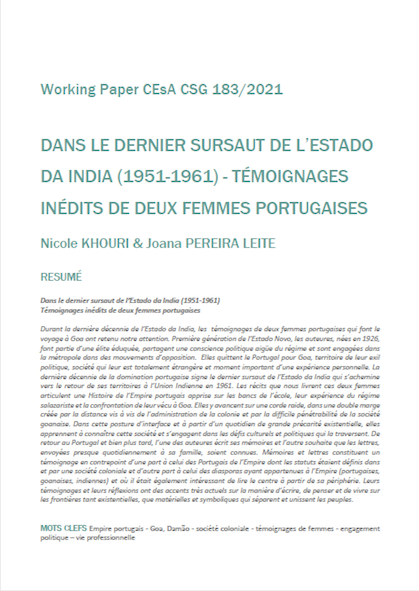
Working Paper 183/2021: Dans le Dernier Sursaut de l’Estado da Índia (1951-1961): Témoignages inédits de deux femmes portugaises
Abstract:
During the last decade of Estado da Índia, the testimonies of two Portuguese women who embark on a trip to Goa have caught our attention, getting us to write Dans le dernier sursaut de l’Estado da Índia (1951-1961) : témoignages inédits de deux femmes portugaises. Born in 1926 and part of the first generation of Estado Novo, the authors belong to an educated elite and share an acute political awareness of the regime, choosing even to engage in the metropolis opposition movements. They left Portugal for Goa, the territory of their political exile, a society totally alien to them and an important moment of personal experience. The last decade of the Portuguese domination sign the last burst of Estado da Índia which is moving towards the return of its territories to the Indian Union in 1961. The stories left by these two women articulate a history of the Portuguese empire, learned on school benches, portraying an experience of the Salazarist regime and the confrontation of the authors’ experience in Goa. There they make their way on a tightrope, created both by the distance to the colonial administration and by the difficult penetrability of Goan society. In this interface and stemming from an everyday of existential precariousness, they get to know this society and engage in the cultural and political challenges that cross it. Back in Portugal and later on, one of the authors write her memories and the other wish for the exposure of the letters, that she daily written to her family . The memoirs and letters constitute a counterpoint testimony, on the one hand to that of the Portuguese of the Empire (whose statuses and belonging were defined in a colonial society) and, on the other, to that of the diasporas belonging to the Empire (Portuguese, Goans , Indians) by where it is also interesting to read the center from its periphery. Their testimonies and their reflections have very current accents on the way of writing, of thinking and living on existential, material, and symbolic borders that both separate and unite people.
Quotation:
Khouri, Nicole e Joana Pereira Leite (2021). “Dans le dernier sursaut de l’Estado da Índia (1951-1961) : témoignages inédits de deux femmes portugaises”. Instituto Superior de Economia e Gestão – CEsA/ CSG –Documentos de Trabalho nº 183/2021.





